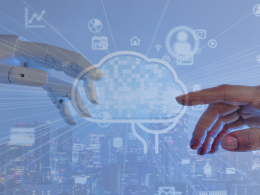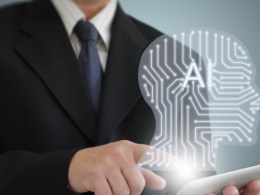By now you must have read and heard a great deal about the three seemingly colossal words- machine learning, deep learning and artificial intelligence.
Feeling dizzy as to how these three terms are different?
You are not the only person who wishes to clarify these terms.
Don’t worry!
Read on to know the difference between machine learning, deep learning and artificial intelligence; how and why they are different, what is their importance (apart from making our lives easier), what is their future and other points.
Let’s Begin…
Machine Learning
A part of artificial intelligence; systems that actually provide a framework to build sophisticated AI components.
This is the ability of a machine to learn from the instructions provided and past experiences and then solve a problem. Algorithms and statistical models are used by machine learning to achieve this feat.

Deep Learning
A subset of machine learning that makes use of artificial neural network (ANN), having several layers between I/O layers.
Thus, the name… Deep, referring to numerous layers that make the most complex of programming easier.
Picture it as your brain that has interconnection of several neurons.
Artificial Intelligence
A field of study that deals with the research and development of computer systems that work on the tasks requiring human intelligence.
The AI-powered machines are able to mirror cognitive functions, such as learning, speech recognition, decision making and problem-solving etc.
It is the term for any computer program that acts smart like humans.

Identifying the Ingredients of the AI Recipe
Now that you know the basic definition of these three close-knit friends, it’s time to dig a little deeper…
Why? Just because digging deep will make the differences crystal clear.
Machine Learning
It is the world of predictions…
It can predict the results based on the data fed to it. In easy terms, machine learns how to solve a problem using an algorithm. It does so on the basis of its past experiences and the instructions given to it.
The aim is to achieve self-learning with the help of data and with minimum human intervention.
Through this, a machine can even learn to distinguish between male and female employees, tell whether the user is happy or angry, predict the human reaction based on a piece of music, tone etc. and many other similar tasks.
Machine learning is the process to achieve artificial intelligence.
Here are some of the areas that machine learning deals in:
– Data collection
– Data filtering
– Data analyzing
– Training algorithms
– Testing algorithms
– Making use of algorithms for future predictions
Deep Learning
An approach to machine learning that aims at training a machine with a data-driven approach rather than a knowledge-driven approach.
It makes use of artificial neural network (ANN) and convolutional neural networks (CNN) to help the computer think and work like a human brain.
Confused as to what are ANN, CNN and DNN? Don’t scratch your head…
DNN and CNN are the subsets of ANN.

There are three layers in a DNN- Input layer, Hidden layer and Output layer.
The data fed into the systems is transformed through several hidden layers before it can produce output.

The entire process of making machines intelligent is termed as Deep learning due to the deployment of astonishingly efficient neural networks.
Artificial Intelligence
Your good old friend, the AI, intends to give such an intelligence level to the machines that they can think on their own and do the things, just like a human being does.
Just recall the TERMINATOR and MATRIX movies and you will get a picture of what an AI is. Right?
Wrong!
The movies have always exaggerated the realm and scope of AI. Any machine that can imitate human cognitive functions, as complex as problem-solving, decision making etc. is termed as intelligent and is AI-powered.
Complex code, algorithms and programs are written to make machines intelligent.
AI can be divided into two broad categories- general and narrow.

AI machines can perform the tasks of the general intelligence category in a logical and perceptive way. The tasks in the narrow intelligence category are done by the AI machines sometimes even better than humans, but these tasks don’t have a wider scope.
Here are the issues that AI deals with:
– Problem solving and reasoning
– Perception Planning
– General intelligence
– Knowledge representation
– Social intelligence
– Natural Language Processing (NLP)
– Motion and manipulation
Feature Based Comparative Study of Machine Learning, Deep Learning and Artificial Intelligence
| Feature | Machine Learning | Deep Learning | Artificial Intelligence |
| Focus Area | Build framework to make machines learn and take decisions on the basis of the instructions given to it | Creating ANNs and CNNs to create machines which do tasks with increased precision and minimal human intervention | Building machines that can imitate human behavior, take decisions and perform tasks that would otherwise require human intervention |
| Characteristic | A subset of artificial intelligence. It is like a process through which a machine transforms into an artificial intelligence creation. Machine learning experts work on the question “How to make machines capable of taking a decision?” | A subset of machine learning that deals with the development and improvement of self-learning architectures, especially for intelligent systems | The parent area that houses other two disciplines. The aim of making systems that can work like humans(taking decisions, learning from mistakes, working on reinforcement and other cognitive tasks) is realized here. |
| Fundamental Problem Statement | Develop a powerful and dependable framework which learns how to recognize patterns and the instructions given to it and works accordingly. | Development of computer programs that learn from unlabeled and labeled data and draw conclusions from it |
|
| Significance |
|
|
AI is everywhere; in all walks of life; almost every future innovation will be AI powered |
| Career Opportunities | ML Engineer | Deep Learning Engineer | AI Researcher |
Applications of Machine Learning, Deep Learning and Artificial Intelligence
Just like any other field, three friends- machine learning, deep learning and artificial intelligence, have eased human life.
The applications developed in these three fields, collaboratively shape our future mode of living.
1. Advancements in Healthcare
Whether it is diagnosing skin cancer based on the symptoms or predicting medicines on the basis of a patient’s history, AI is totally remolding and advancing healthcare.
With the advancements coming in, increased precision is now possible in the realm of medicine, life sciences and health management.
Computer-aided diagnosis and detection and quantitative imaging will completely change the face of the healthcare system.
2. Image Recognition
With the advancements in machine learning algorithms, image recognition is now possible with increased precision.
The machine identifies an image based on the previous knowledge and identification.
You must have seen the auto-tag feature of Facebook. It is one of the best examples of image recognition.
Besides, different sectors like tourism, gaming, retail etc. are also experiencing the might of image recognition.
3. Refining Search Engine Results
Search engines make use of machine learning to refine the search results.
- Did you click the top results or ignored them and moved to the few specific ones?
- Did you click the middle links or the ones at the last?
- Did you stay for long on the web page you opened or quickly drifted away?
- Did you even go to the page 2 of search results?
These are some of the points that the back-end algorithms focus on after you searched for a particular term. This not only helps in refining the search results according to the user but also collecting the data related to a specific search term.
4. Advancement in the Finance Sector
This is one of the most powerful applications of AI.
Why?
Because critical tasks, such as processing large amount of data, analysis with increased accuracy and real-time reporting etc. is now a slice of cake. It is a no-brainer that AI-powered systems have increased efficiency and accuracy.
Therefore, the finance sector is fast implementing automation, algorithm-based trading, chat-bots etc. into its daily operations.
Automated advisors can now predict the best investment option and scan reports on the basis of millions of points and thus save the day for the customers as well as the workers in this sector.
The Real Picture
Thanks to the rate of advancement in the AI sphere, that day isn’t far when you will see intelligent machines everywhere.
They have entered our world and are keeping us amazed.
- Do you know Sophia?
- Did you hear that AlphaGo defeated the world Go champion?
Machine learning too, has come a long way from how to what dynamics. This is empowered by the application of highly complex ANNsSo, the how part now rests with the algorithms.
Are machine learning and deep learning advantageous?
The presence of big data ensures that the machine has ample of data from where it learns what to do.
And, this is the point where machine learning and deep learning come into the picture and school the machine with the right lessons. But the data is not fed to the machines like anything; it is structured and then given in the form of required datasets.
Think of ANN, CNN and DNN to be the professors who are determined to make their student (the machine) a self-learning student.
![]() As a result of this teaching system, the framework learns what to do, stores related information and uses this information to take decisions (give output). In the long run, the machine also starts analyzing the importance of a parameter.
As a result of this teaching system, the framework learns what to do, stores related information and uses this information to take decisions (give output). In the long run, the machine also starts analyzing the importance of a parameter.
Do you know there is yet another pair that can cause equal commotion as the subject of this article? Yes, it is data science, machine learning and artificial intelligence.
But when the concepts are clear, there’s no hindrance to move forward. Being interrelated to each other, these three mighty giants are nothing on a standalone basis; they lose their importance and are almost non-existent.
Remember, anything to be AI-powered has to cross the two layers- machine learning and deep learning.
Miss one level and your product is no more than a fused wire.







Highly informative. Short and crisp